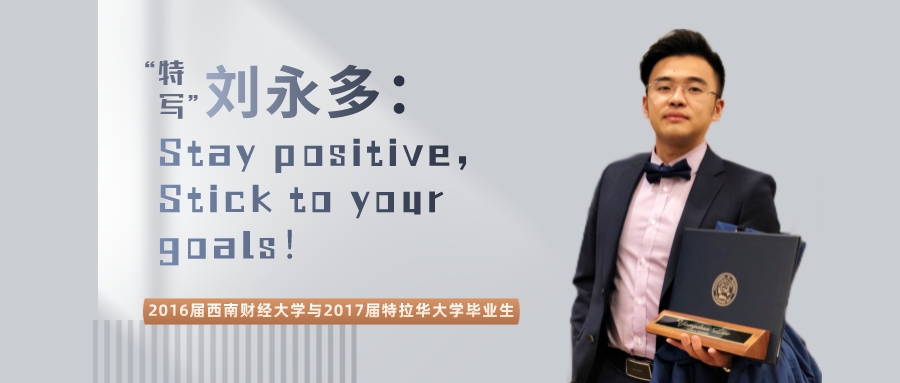
Hi everyone, my name is Yongduo Liu. I was a class 2012 SWUFER, majored in Electronic Commerce, and then captain of our college’s soccer team. I came to the United States under the Dual degree program in 2014, spent three years here at UD, and graduated with a dual major in Mathematics and Finance in 2017. Then I went to the University of Illinois at Urbana-Champaign for my Master’s degree in Financial Engineering. Since graduating in December 2018, I’ve worked as a Quantitative Risk Analyst at Mortgage Guarantee Insurance Corporation. My major responsibility was to leverage my knowledge in Financial Valuations to conduct credit analysis to support the company’s strategic decisions.
I would like to share some of my experiences over the past few years I review as crucial for my education as well as a professional career. I will do it from more of a macro perspective and a practical perspective.
Most importantly, I still believe that learning how to be a good person is critical.
• Treating your classmates, and your friends faithfully will bring you a lot of help in your future education or career. This not only applies to your Chinese classmates but also to Americans, and any other international students.
• Always be humble to learn from others. Encourage yourself to seek help from others. Most Chinese international students are shy. But most people are willing to help you if you ask. They are willing to share their experiences that can help you find out what you want to achieve and help you understand how to achieve it.
• Studying in another country could be tough and miserable. There might be a lot of unexpected disappointment. It’s inevitable, but you need to learn to adjust your motions quickly. Smile and keep your heads up. Then keep working towards your goals.
Then I would like to share some insights I got from working for about three years in the United States.
• My job gives me a lot of opportunities to apply what I learned from my undergrad and graduate study. This is easier than learning things from scratch while working.
• The work environment is more friendly. Great work-life-balance. Most likely, you will work with a supportive director, rather than giving you a lot of pressure. They are generally willing to patiently guide you to grow in many aspects. They will also make sure your effort is recognized.
• The company is willing to invest time and money to help you grow further. They will sponsor the fee for certification exams and material for studying for them. They are willing to let you take time off to study for them. Arrange you to go to professional conferences to broaden your perspectives.
• Positive peer pressure is promoted, rather than ‘unhealthy’ competition. All our team is willing to invest our own time in improving ourselves, and being supportive of each other. My director goes to MBA classes over the weekend. My colleague is earning her online master's degree. I am studying for the Actuary.
Lastly, I can share some skills and knowledge I found valuable for obtaining a favorable job in the United States.
• Communication skill is very important. You need to learn how to effectively communicate your thoughts logically on various occasions, such as writing your resume, getting through interviews, and writing professional emails. Some of my experiences helped me develop my communication skills. I was part of UD’s largest business Fraternity (Delta Sigma Pi) and UD’s BlueHen Investment club. I gain a lot of opportunities to grow my verbal and writing skills through those experiences. Also, while at UIUC, I was part of the student consulting organization, where I worked along with other students to manage business consulting projects for various types of companies. These experiences really helped me improve my communication skills.
• Master at least one programming language. R is easier but quite efficient. Python has a broader application. C++ is a more difficult but even broader application. I believe a lot of courses taught at SWUFE will equip you with sufficient fundamentals for these programming languages. Mathematics and Stats are useful and relevant. It helps you understand and appreciate the mathematical & Statistical theories behind many financial models.
• Last but not the least, invest your own time to earn some certificates. I couldn’t agree that these certificates will grant you a good job directly, but they will help you in many indirect ways. For instance, if you want to get into the Finance business, the CFA curriculum is helpful in the way it provides a comprehensive understanding of almost the whole financial market. The actuarial curriculum provides fundamentals for applying math & statistical knowledge in pricing and evaluating insurances. As I know, many insurance companies offer an “Actuarial Program” to their employee. They specifically tell you if you pass one of the exams, they will cover the cost and increase your pay rate.
Hope my experience could help you in some way. To summarize what I shared, I would like to quote Steve Jobs: “Stay foolish, stay hungry!”. Let’s go, Swufer.
Lastly, if you have any questions, I am happy to answer via email: yongduo0829@gmail.com.
Click here to watch Yongduo’s video:
https://mp.weixin.qq.com/s/7DN590wtn918WpwPfVqF_A
Editor: ZHAO Xiaoyu, Zhu Yunyi
Proofreading: LI Zeyu